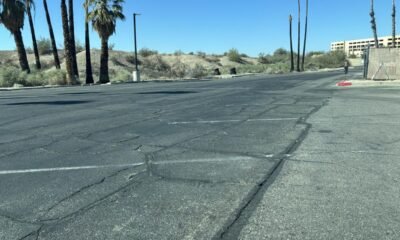Politics
Bahama Ave Resort Faces a Setback from Lake Havasu City P&Z Commission

The Lake Havasu City Council convened Tuesday evening, ultimately voting 4-3 to return two requests regarding a proposed 14-acre resort at 1850 Bahama Avenue to the Planning and Zoning Commission for further scrutiny.
Developer Studio KDA’s ambitious project plans include five four-story residential buildings with a total of 172 units, a two-story commercial/restaurant space, a surf pool, and a lagoon. Additionally, the proposal allocates for 681 parking spaces, with 315 designated for boat and RV parking.
After two and a half hours of public commentary and discussions, Council Member Nancy Campbell voiced her support, prompting a motion to refer the general plan amendment back to the commission, which passed narrowly.
The council also voted 4-3 to send the planned development and rezoning request back for additional evaluation. Developer Cole Cannon spent an hour presenting the project and responding to council inquiries before the council entered an executive session to discuss legal considerations with municipal attorneys.
Mayor Cal Sheehy initiated key discussions, questioning whether the development would feature primarily hotel rooms or long-term rentals, a detail unresolved in previous meetings. Cannon clarified that the project’s primary focus would be as a resort, with potential inclusion of long-term rental options.
Despite some support, several council members raised objections prior to listening to public feedback. Council Member Jim Dolan voiced apprehension regarding the shift in property use from multi-family to resort, emphasizing a need for long-term rental options. Vice Mayor Cameron Moses shared similar sentiments, expressing discomfort with replacing high-density housing with commercial enterprises.
Council Member David Lane criticized the absence of a clear plan, noting that residents’ concerns seem largely overlooked. He also referenced a flyer promising incentives to supporters of the resort, stating, “My vote is a hard no.”
Cannon reassured the council that their commitment to the project would cease if community sentiments remained negative, expressing willingness to adapt plans based on public input. “If the city doesn’t want this, life is too short, and I’ll move onto the next project,” he affirmed.
Residents echoed grievances heard in previous hearings, specifically regarding traffic congestion, noise pollution, water usage, and staffing implications. Conversely, some community members argued the resort would be preferable to constructing 280 residential units and highlighted the potential for shared leisure facilities.
The project will be reviewed again at a future Planning and Zoning Commission meeting, as the dialogue surrounding its impact continues.


















